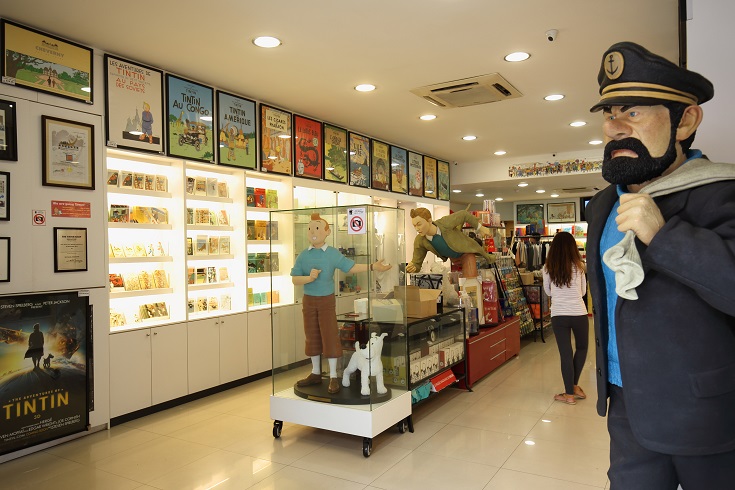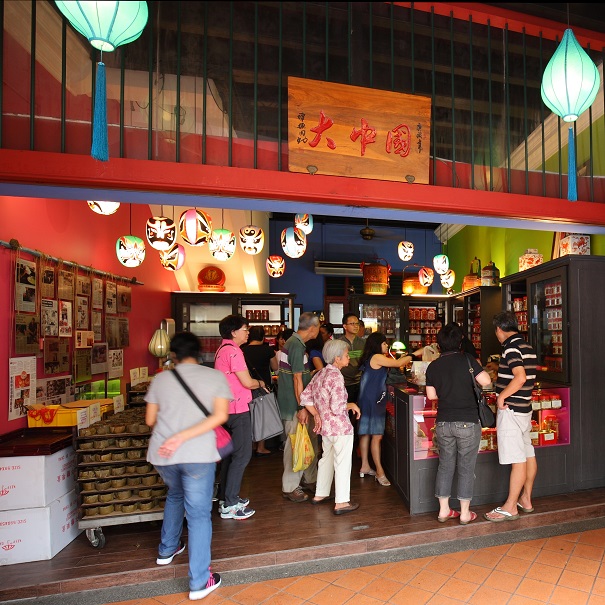Chinatown — beyond the Festive Bazaar
By Michael Lim
Chinatown Festive Street Bazaar 2017 on the corner of Trengganu Street and Smith Street

During the Lunar New Year, Singaporeans and tourists alike will head to Chinatown to soak in the festive atmosphere: brightly decorated shops selling Chinese New Year goodies, the canopy of red lanterns hung across the streets and the annual Chinatown Festive Street Bazaar, which lasts for three weeks until the eve of Chinese New Year.
Chinatown Festive Street Bazaar 2017 in full swing on Temple Street

This is the time when Chinatown — bordered by North Bridge Road, Pagoda Street, Temple Street, Smith Street, Sago Street and Trengganu Street — is completely transformed, and the whole area comes alive.
The shop selling The Adventures of Tintin comics by Hergé as well as memorabilia is located on Pagoda Street
Advertisement

“You won’t feel the Chinese New Year festive spirit until you visit the annual Chinatown bazaar,” says Mary Sai, Knight Frank Singapore’s executive director of investment and capital markets. “And this is the best time for businesses located there — where they try to capitalise on the crowd and gain as much sales as they can.”
Several traditional shops in Chinatown have been there for more than 20 years. They continue to remain popular today, says Sai, a frequent visitor to Chinatown both on a personal capacity and in the course of brokering sales of shophouses there since the 1990s.
The shops include Lau Choy Seng, which specialises in kitchen- and dinnerware, and Mei Heong Yuen Dessert, both of which are on Temple Street. Chop Tai Chong Kok Confectionery, which specialises in mooncakes and traditional Chinese New Year cookies, is located on Sago Street. On New Bridge Road, there are Thye Shan Medical Hall and famous Lim Chee Guan bak kwa (sliced barbecue sweetand-savoury meat).
Lau Choy Seng was established in October 1948 and branched into supplying dining- and kitchenware in the 1970s

The old guards of Chinatown
Lau Choy Seng
Lau Choy Seng was established in October 1948 by Lau Chew Tat. The company had its origins as a maker of wooden clogs, with Lau working out of a small shop on Temple Street. As his business expanded, he moved to bigger premises at 38 Temple Street in the 1960s. In 1970s, the Lau family diversified into the supply of kitchen- and dinnerware. By 1993, the kitchen and dinnerware business had grown so large that the business had to relocate to its current premises in two neighbouring shophouses at 23 and 25 Temple Street.
Lau Choy Seng was established in October 1948 by Lau Chew Tat. The company had its origins as a maker of wooden clogs, with Lau working out of a small shop on Temple Street. As his business expanded, he moved to bigger premises at 38 Temple Street in the 1960s. In 1970s, the Lau family diversified into the supply of kitchen- and dinnerware. By 1993, the kitchen and dinnerware business had grown so large that the business had to relocate to its current premises in two neighbouring shophouses at 23 and 25 Temple Street.
European brands that have appointed Lau Choy Seng as their distributor include UK’s Athena (which manufactures tableware for hotels and restaurants); Italian brand Bormioli Rocco (supplier of glassware); and French brand de Buyer (which manufactures stainless steel and aluminium kitchenware and pastry making utensils). The company has supplied kitchenware and dinnerware to F&B establishments such as Din Tai Fung, Harry’s as well as those at Marina Bay Sands and Sofitel So Singapore.
Advertisement
Mei Heong Yuen Dessert, brainchild of the daughters of Mei Heong Yuen’s founder, is located on Temple Street

Mei Heong Yuen Dessert
Located on the other end of Temple Street is Mei Heong Yuen Dessert. The business is a spinoff from Mei Heong Yuen Food Industries, famous for its Farmer Brand Groundnuts, which has been in Malaysia and Singapore since the 1940s. It was the brainchild of founder Lee Chit Heng. The company is also an agent of London Roll cakes and Fruit Plus Chewy Candies.
The business is now run by Lee’s daughters, Connie and Clara. They have diversified the business to include traditional desserts under Mei Heong Yuen Dessert, which specialises in traditional Chinese desserts and the famous “Snow Ice”. The flagship store has been at its current Temple Street location for more than 15 years. The business has also expanded, and there are now six Mei Heong Yuen Dessert shops in Singapore.
Chop Tai Chong Kok Confectionery has been at its Sago Street location since 1935, specialising in mooncakes and cookies

Chop Tai Chong Kok Confectionery
A stalwart in Chinatown is Chop Tai Chong Kok Confectionery, which was established there in 1935. It was founded by Tham Kai Chee, who migrated to Singapore from Guangzhou, China with his wife in 1930 in search of a better future. Although he had no baking experience, Tham learnt to make mooncakes. Before long, there was a long queue outside his shop on Sago Street as people waited in line to purchase his freshly baked mooncakes.
The business is now in the hands of the third generation, specifically Ham Weng Seng, and the company continues to make traditional Cantonese mooncakes. The business has also expanded to five outlets as at 2015, reportedly selling up to 30,000 mooncakes a day during the Mid-Autumn Festival. Chop Tai Chong Kok Confectionery now also bakes Chinese New Year cookies such as Kueh Bangkit, Kueh Kapit (“love letters”), cashew nut cookies and pineapple tarts.
Advertisement
Thye Shan Medical Hall
Founded in 1955 by the late Chan Chak Poey, who migrated to Singapore from Guangdong province, Thye Shan Medical Hall continues to provide Chinese medicine and physician services. The shop has been at its New Bridge Road location since 1955. Over the years, as Chinatown has been modernised, the shop has benefited from its location near the Chinatown MRT station and the pedestrianised Pagoda Street.
The company has four retail shops in Singapore today. It also has its own line of herbal supplements and medicated oils under the Thye Shan and Pin Li brands. Its range of products has since expanded to include premium tonics, health supplements, herbal tea and other health products.
Buyers queue to buy barbecue pork at Lim Chee Guan’s store located along New Bridge Road

Lim Chee Guan Bak Kwa
Established in 1938 by the late Lim Kay Eng, the outlet at New Bridge Road continues to draw crowds during the Chinese New Year period. The business has since expanded to two other branches at People’s Park Complex and ION Orchard under the second generation headed by Lim’s son, Rod Lim, 63. The main Lim Chee Guan Bak Kwa shop is located on New Bridge Road.
Shophouses remain sought-after
Despite the historic Chinatown district coming to life twice a year — during Chinese New Year and the Mid-Autumn Festival — the shophouses in Chinatown continue to be sought after by investors, says Knight Frank’s Sai.
The 100m Chinatown Food Street on the pedestrianised section of Smith Street opened in 2014 after a $5 million facelift

Last September, for instance, Fragrance Foodstuff paid $20.5 million to purchase two adjoining shophouses on the corner of New Bridge Road and Pagoda Street. The price translated to $3,535 psf, based on a total gross floor area of 5,800 sq ft for both shophouses. The seller, who had bought them in June 2001 for $4.1 million ($2,366 psf), realised a gain of 400%.
The properties sit on a 99-year lease with effect from January 1995, and therefore has 78 years remaining on it. Fragrance Foodstuffs, which specialises in Chinese bak kwa, has been renting the ground-floor premises for its flagship store for more than 12 years.
Besides business operators such as Fragrance Foodstuffs, these shophouses are also sought after by private-equity funds, family offices and high net worth investors, says Sai. Many of them are holding on to these properties for the long term and are in no hurry to sell. Thus, there have been few transactions of shophouses in Chinatown, she adds.
A freehold, 1,076 sq ft shophouse located on Smith Street was sold in September 2016 for $8.8 million ($8,208 psf). The seller had bought it for $7.5 million ($6,996 psf) in March 2013.
TakPo Dim Sum Restaurant on Smith Street

Ground-floor units of shophouses in Chinatown that have been leased to bak kwa shops, F&B outlets or goldsmith shops tend to command rental rates of $10 to $12 psf per month, notes Sai. “These days, a lot of the landlords are quite mindful about keeping their rental rates competitive to keep their tenants and ensure that the business can be sustained.”
This article appeared in The Edge Property Pullout, Issue 764 (Jan 30, 2017) of The Edge Singapore.
https://www.edgeprop.sg/property-news/chinatown-%E2%80%94-beyond-festive-bazaar
Tags: |


Follow Us
Follow our channels to receive property news updates 24/7 round the clock.
Subscribe to our newsletter
Advertisement
Advertisement
Advertisement
Top Articles
Search Articles
